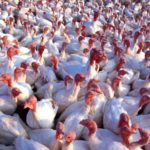BRANSON MO NEWS:
A commercial flock of about 20,000 turkeys in southwestern Missouri has turned up with low-pathogenicity (“low-path”) H7N1 avian flu, marking the first such case in the U.S. this year.
The flock was on a turkey farm in Jasper County, about 140 km northwest of Branson. Missouri is on the Mississippi flyway for migratory birds, which generally runs up into Ontario, Manitoba and parts of Saskatchewan.
According to the report filed Tuesday by the U.S. Department of Agriculture with the World Organization for Animal Health (OIE), the flock has shown no clinical signs of bird flu or increased death loss. The virus was discovered Feb. 26 during routine pre-slaughter testing and surveillance for H5 and H7 avian flus.
ADVERTISEMENT
USDA said its Animal and Plant Health Inspection Service (APHIS) and Missouri state officials are investigating further and have set up “enhanced surveillance and testing” in the area.
Two other commercial poultry operations located within 10 km of the farm have tested negative for avian flu, USDA said.
The farm, which housed 20,000 birds, has been quarantined and is to be depopulated of birds through “controlled marketing,” which, according to Ontario’s Feather Board Command Centre, is a strategy allowing poultry either infected with or exposed to low-path H5 or H7 viruses to move to market on a “limited basis.”
According to Health Canada, there’s no evidence to suggest the consumption of thoroughly cooked poultry or eggs can transmit avian flu to humans. Rather, evidence suggests the most likely means of transmission of an avian flu virus to people is close human contact with live infected birds.
According to the Canadian Food Inspection Agency, H5 and H7 subtypes of avian flu are of particular concern in live poultry, as they’ve shown an ability to mutate from low-path to high-path after they infect …

Author:
Powered by WPeMatico


